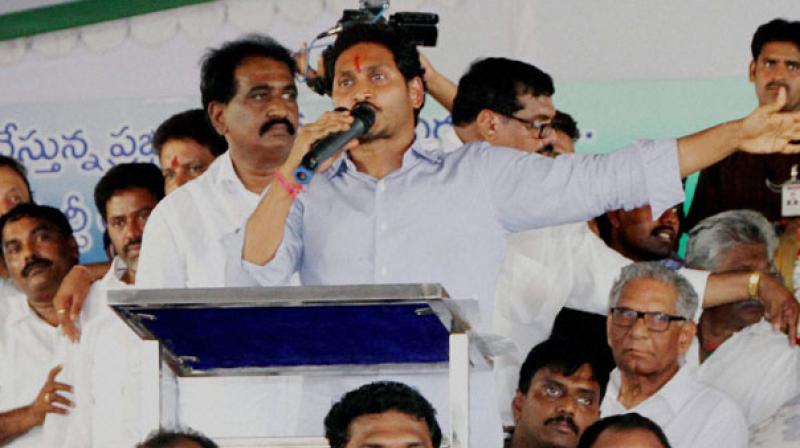
Prosecuting journalists in the name of false news will stifle dissent

A recent Government Order (GO) issued by the Andhra Pradesh government threatening to initiate criminal prosecution against media persons for “false”, “baseless” and “defamatory” news items raises apprehension on the government’s intent.
Given the pendency in courts and delay in dispensation of cases, there is every possibility to fear that the prosecution itself is persecution, though it might result in acquittal. The process that may stretch on from years to decades is itself enough to silence the voices of criticism.
What the GO said?
The GO 2430 issued by the general administration (I&PR) department of the Andhra Pradesh government on October 31 delegated powers to secretaries of all government departments to lodge complaints and file appropriate legal cases through the public prosecutor against “false”, “baseless” and “defamatory” news items published/telecast/posted in print/electronic/social media.
The order said the government has observed that certain print, electronic and social media are deliberately trying to tarnish the image of the government and its officials by spreading false, baseless and defamatory news with mala fide intention. “In order to see that true and correct information reaches the people, government has empowered special commissioner, I &PR to file cases under appropriate sections of the law,” the order stated.
Also read: Maverick petitioners misusing sedition law to throttle dissent
“It is felt that departmental secretaries with thorough knowledge of the affairs of their respective departments and also having powers and wherewithal to order enquiries to establish the veracity of news reports/posts in print, electronic, and social media are better placed to issue rejoinders, file complaints and lodge appropriate cases, if need be, through public prosecutor after following due process of law,” the order said.
The GO made it clear that all special secretaries/principal secretaries/secretaries in the departments of Andhra Pradesh Secretariat shall take necessary action accordingly.
The order issued in the name of the Andhra Pradesh Governor was signed by T Vijay Kumar Reddy, special secretary to the government (I & PR).
Trial without probe?
If in 2007 only the special commissioner of I &PR was empowered to file criminal defamation cases, the latest GO empowers all special secretaries/principal secretaries/secretaries in the state secretariat to initiate multiple prosecutions.
Even though the GO states that it has empowered “government departmental secretaries with thorough knowledge of the affairs of their respective departments and also having powers and wherewithal to order inquiries to establish the veracity of news reports”, it mainly empowers all officers to initiate criminal defamation cases.
The question is why didn’t the government instruct the officers to issue rejoinders, details, explanations and complete information bulletins to clarify or condemn the false or baseless news instead. Without examining whether a post or an article was really targeting an individual public servant, how can the government delegate powers to secretaries to prosecute media persons through a blanket order?
Impersonal bodies can’t fear defamation
Can a government prosecute media persons for criminal defamation for their criticism, negative writing against the government, because it believes the publication was tarnishing its image? The answer is no government can delegate power to all its officers to prosecute media persons, in general, without examining whether a specific publication was defamatory or not.
One should know, first, that a government or a ministry or a department is an impersonal body which cannot claim right to reputation that is only available to individual persons or artificial persons like companies or parties.
Also read: Information Commissions now just toothless tigers
Under law, a chief minister, a minister or an IAS officer is a public servant, whose personal reputation needs to be protected. The state has authority to order prosecution of media persons if such officials or ministers are defamed for their actions in government.
If any public servant feels he was defamed by any publication about his public activity, with false allegations, he can seek permission to initiate prosecution of the publisher. The concerned officers and experts, including legal experts, need to study the facts of the case and if they find justification, the prosecution for his defamation could be cleared. This is the due process expected to be followed.
But the Andhra Pradesh government has issued a GO that scuttles this process and permits every officer to initiate prosecution of media persons in a wholesale delegation of special power to them.
Criticism isn’t defamation
Public servants who are supposed to serve the state with public money are answerable to criticism. They cannot consider every criticism as defamatory. It is the duty of citizens (including media) to criticise the actions of the government, like an opposition in the Assembly. Even if the opposition sits silently for its own political interests, the media is expected to play the role of the opposition in critically analysing the government’s action or inaction. Even if a newspaper is campaigning against the government, the ruling party, or its leaders with false and baseless news, its editor can be prosecuted only when the post or news article is defamatory, but not simply because of adverse writings.
The power in the hands of the state to prosecute journalists for criminal defamation is a very high power and cannot be misused to silence the democratic exercise of free speech. Criminal defamation is abolished in many democratic countries while ruling parties in India are misusing it to scare opposition and scuttle criticism.
(M Sridhar Acharyulu, former Central Information Commissioner and Dean, School of Law, Bennett University)
(The Federal seeks to present views and opinions from all sides of the spectrum. The information, ideas or opinions in the articles are of the author and do not necessarily reflect the views of The Federal)

